Cinco cortometrajes gallegos de reciente creación protagonizan la undécima edición del Galician Film Forum en Londres

El Galician Film Forum (GFF) celebrará su undécima edición, titulada ‘Shorts Edition’, con un programa centrado en cortometrajes del audiovisual gallego que han visto la luz recientemente. La actividad tendrá lugar el viernes, 22 de noviembre, en la universidad King´s College London [19 h, Edmond J Safra Theatre, Strand Campus, WC2R 2LS]. Los títulos seleccionados para la ocasión son ‘A nena azul’ de Sandra Sánchez, ‘Marusía’ de Pedro Sancho, ‘Soy una tumba’ de Khris Cembe, ‘Limbo’ de Daniel Viqueira y ‘Beautiful Boy’ de Fran X. Rodríguez. Además, tras las proyecciones el público tendrá la oportunidad de mantener un coloquio con la directora y montadora Sandra Sánchez, que se desplazará a Londres para participar en esta edición.
Como es habitual, todas las cintas se proyectarán en versión original con subtítulos en inglés y el encuentro se celebrará en inglés y gallego. La entrada del evento es gratuita pero es preciso reservarla con antelación en el siguiente enlace. Esta undécima edición del GFF cuenta con el apoyo del Departament of Spanish, Portuguese and Latin American Studies del King´s College London, el patrocinio de ABANCA y la colaboración de la Oficina para Asuntos Culturales y Científicos de la Embajada de España en Londres.
El programa de esta Shorts Edition trae hasta Londres una selección de recientes cortometrajes gallegos que destaca por su diversidad de géneros. Con la ficción como hilo conductor, el público va a tener la oportunidad de visionar obras llenas de humor como “Beautiful Boy” o “Marusía”. También habrá espacio para la reflexión poética que planea en ‘A nena azul’ e, incluso, piezas de estilos poco habituales en el cortometraje gallego como la animación o el terror y de los que son buenos ejemplos “Soy una tumba” y “Limbo”, respectivamente.
Cortos multipremiados
Además de su carácter reciente, los títulos que se proyectarán en el Galician Film Forum comparten una exitosa trayectoria en festivales cinematográficos. En este sentido, hay que destacar la participación de ‘Limbo’ en más de un centenar de encuentros y que, por ahora, se ha traducido en una veintena de galardones entre los que destacan el de mejor cortometraje en el Grimmfest Manchester’s Festival of Fantastic Films; mejor director en el Cryptshow Festival; la Calaverita de Bronce en el Morbido Film Fest; el Premio Jurado Joven del Festival Ibérico de Cinema, el Mejor Cortometraje en Terroríficamente Cortos o el de Scariest Film en el Desmond District Demons, entre otros.
El éxito de ‘Soy una tumba’ también merece una mención especial ya que, además de poder presumir de haber sido nominado en la categoría de Mejor cortometraje de animación en los Premios Goya de este año, atesora un palmarés que no para de crecer a su paso por festivales. En ese listado destacan el de Mejor Cortometraje de Animación en los XVII Premios Mestre Mateo; Mejor Cortometraje de Animación en el Festival de Cortometrajes La Fila de Valladolid; Mejor Cortometraje Nacional en Cortoons Gandia 2019; Mejor Cortometraje Nacional y Mejor Cortometraje de Animación en el Festival Nacional de Ciudad de Ávila Ávilacine; Mejor Guion en Anima Deba Animazio Zinemaldia; el primer premio en el Ourense Film Festival; o el de mejor cortometraje de animación en el XX Festival de Cortometrajes Asier Errasti, por citar algunos.
Por su parte, ‘A nena azul’ aterriza en Londres con la Mención Especial del Jurado Planeta GZ y el Premio CREA a la mejor dirección Gallega XV del Curtocircuito International Film Festival (Santiago de Compostela); el Premio Mestre Mateo al Mejor Cortometraje en la XVII edición de estos galardones que concede la Academia Galega do Audiovisual; y los premios a la Mejor Fotografía y el Mejor Sonido en el VI Festival Nacional de Cortometrajes de Talavera de la Reina (Madrid).
En lo que respecta a ‘Beautiful Boy’, ha sido reconocido en varias ocasiones con el premio del público, como por ejemplo en el XVI Festival de Cans y en el Primavera do Cine, y también ha recibido galardones como el Premio al Mejor Guion de la Mostra de Curtas Vila de Noia. Para finalizar, ‘Marusía’, el cortometraje más reciente de los seleccionados, tuvo su premier internacional en el 8º Resistencia Film Festival de Chile y consiguió este octubre el Premio del Público al Mejor Cortometraje Gallego en la XLI Semana del Cine de Lugo.
Mirada atlántica
La invitada especial de esta edición del Galician Film Forum es la directora y montadora Sandra Sánchez. En el año 2011 presentó su proyecto más personal, el documental “Tralas luces”, una obra a la que dedicó cuatro años y que fue estrenada en la sección de nuevos directores del Festival de San Sebastián. Posteriormente continuó trabajando como montadora en series, documentales y películas como ‘Migas de pan’, ‘Esquece Monelos’, ‘Querida Gina’ o ‘Rafael’. También dirigió los cortometrajes ‘Matías’, dentro del encuentro de cineastas Chanfaina Lab, y ‘A nena azul’.
En la actualidad, Sandra Sánchez trabaja en el Laboratorio de Producción Audiovisual de los Museos Científicos Coruñeses y está escribiendo el guion del que será su primer largometraje de ficción, ‘La nadadora’, un proyecto íntimamente ligado a ‘A nena azul’, pues los dos films tienen la misma protagonista.
Galician Film Forum
El GFF nació en 2015 en el seno de un grupo de gallegos emigrados a Londres con el objetivo de crear un espacio para la difusión del cine gallego en la capital británica. Su actividad se articula en tres ejes: como plataforma de exhibición, como observatorio de la nueva diáspora creativa audiovisual en el Reino Unido y como espacio de reflexión sobre el cine y la cultura gallega en términos universales.
- Entradas: https://gffshortsedition.eventbrite.co.uk
- A nena azul: http://anenaazul.com/
- Limbo: https://www.facebook.com/curtametraxelimbo
- Soy una tumba: https://www.facebook.com/soyunatumba/
- Marusía: https://www.facebook.com/contarteproduce/
- Beautiful Boy: https://www.nenobonito.info/
Five recent Galician short films to be screened at the 11th Galician Film Forum in London

The Galician Film Forum (GFF) will celebrate its 11th event, titled ‘Shorts Edition’, with a programme focused on Galician short films that have been released recently. The event will take place on Friday 22 November at King’s College London [19 h, Edmond J Safra Theatre, Strand Campus, WC2R 2LS]. The films that have been selected for the event are ‘A nena azul’ by Sandra Sánchez, ‘Marusía’ by Pedro Sancho, ‘Soy una tumba’ by Khris Cembe, ‘Limbo’ by Daniel Viqueira and ‘Beautiful Boy’ by Fran X. Rodríguez. After the screening, the audience will have the opportunity to speak with director and film editor Sandra Sánchez, who will be in London to participate in this event.
As is usual, all of the films will be screened in Galician with subtitles in English and the event will take place in English and Galician. Tickets are free, but it is essential to reserve them in advance at this link. The eleventh edition of the GFF has been made possible thanks to support from the Department of Spanish, Portuguese and Latin American Studies at King’s College London, sponsorship from ABANCA and collaboration from the Office for Cultural & Scientific Affairs at the Spanish Embassy in London.
This Shorts Edition will bring a range of recent Galician short films to London. With fiction as the main thread running through the selection of films, the audience will have the opportunity to watch films that are full of humour like “Beautiful Boy” and “Marusia”. There will also be space for poetic reflection, as in “A nena azul”, and even some short films which are quite unconventional for this genre in Galicia, like animation and terror, with “Soy una tumba” and “Limbo” standing as good examples.
Award-winning short films
As well as having been released recently, the films that will be screened at the Galician Film Forum share in having had significant success at film festivals. In this regard, the successes of ‘Limbo’ must be underlined. ‘Limbo’ has participated in more than a hundred festivals and has received twenty prizes to date, including best short film at Grimmfest Manchester’s Festival of Fantastic Films; best director at Cryptshow Festival; the Calaverita de Bronce at the Morbido Film Fest; the Young Jury award at the Festival Ibérico de Cinema, Best Short Film at Terroríficamente Cortos and the award for Scariest Film at the Desmond District Demons, amongst others.
The success of ‘Soy una tumba’ also deserves a special mention since, as well as having been nominated for Best animated short film at the Goya awards this year, it continues to win awards as it goes around different festivals. Some of these awards include Best Animated Short at the XVII Premios Mestre Mateo; Best Animated Short at the Festival de Cortometrajes La Fila de Valladolid; Best National Short Film at Cortoons Gandia 2019; Best National Short Film and Best Animated Short Film at the Festival Nacional de Ciudad de Ávila Ávilacine; Best Script at Anima Deba Animazio Zinemaldia; first prize at Ourense Film Festival; and best animated short film at the XX Festival de Cortometrajes Asier Errasti, to cite just a few.
‘A nena azul’ lands in London having won the Special Mention prize from the jury at Planeta GZ and the Premio award for best directing Gallega XV at the Curtocircuito International Film Festival (Santiago de Compostela); the Mestre Mateo award for Best Short Film at the XVII edition of this ceremony which is organised by the Galician Audiovisual Academy. It has also won prizes for Best Photography and Best Sound at the VI National Festival of Short Films in Talavera de la Reina (Madrid).
With regards to ‘Beautiful Boy’, it has been recognised on several occasions, winning the audience prize for example at the XVI Festival de Cans and Primavera do Cine. It has also received awards like the prize for Best Script at the Mostra de Curtas Vila de Noia. To close, ‘Marusía’, the most recent of the short films that the Galician Film Forum will be screening, won its first international award at the 8th Resistencia Film Festival de Chile and won, in October, the Audience Award for Best Galician Short Film at the XLI Semana del Cine de Lugo.
Atlantic Gaze
The guest of honour at this edition of the Galician Film Forum is the director and producer Sandra Sánchez. In 2011 she presented her most personal project, a documentary called “Tralas luces”, which took four years to make and was premiered in the section for new directors at the Festival de San Sebastián. Sánchez then continued working as a producer on a variety of series, documentaries and films like ‘Migas de pan’, ‘Esquece Monelos’, ‘Querida Gina’ and ‘Rafael’. She also directed the short films ‘Matías’, which appeared at Chanfaina Lab, and ‘A nena azul’.
Sandra Sánchez is currently working in the Laboratory for Audiovisual Production at the Scientific Museums of A Coruña and she is writing the script for what will be her first feature-length fiction film, ‘La nadadora’, a project intimately linked to ‘A nena azul’ because both films have the same protagonist.
Galician Film Forum
The GFF started in 2015 when a group of Galicians living in London came together to create a space for Galician cinema in the British capital. It functions in three different ways: as an exhibition platform, as an observatory for the new creative audiovisual diaspora in the UK and as a space for reflecting on Galician cinema and culture in universal terms.
- Tickets: https://gffshortsedition.eventbrite.co.uk
- A nena azul: http://anenaazul.com/
- Limbo: https://www.facebook.com/curtametraxelimbo
- Soy una tumba: https://www.facebook.com/soyunatumba/
- Marusía: https://www.facebook.com/contarteproduce/
- Beautiful Boy: https://www.nenobonito.info/
Great Spanish gastronomic celebration at Quique Dacosta’s new restaurant in London
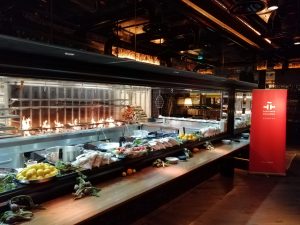
Restaurant Arros QD and Instituto Cervantes in London organized a gastronomic night called ‘Mastering the Art of Rice ‘, in which 50 guests learnt in depth about the authentic Valencian paella from the team of awarded chef Quique Dacosta.
“Our intention is always led by the concept of sharing knowledge. It’s not just about cooking noble and excellent products. In this case, we intend to share with the United Kingdom the story of paella and its authentic recipes, as we do with Spanish haute cuisine in our three Michelin-star restaurant in Dénia,” said Chef Dacosta.
Over an impressive eight-metre flame grill at Arros QD, the 50 guests learnt the secrets to cooking an authentic paella – widely acknowledged as Spain’s most international recipe. They did it together with the restaurant’s head chef, Richard De la Cruz, who highlighted paella as a social event that gathers people around the table together.
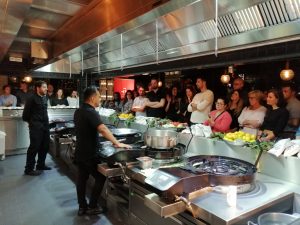
“These events underline the quality of Spanish cuisine both in its tradition and in its avant-garde vocation and business side. It’s great to partner with a world-renowned chef to show the quality of our cuisine and our wines and reach the heart of Londoners,” said director of Instituto Cervantes in London, Ignacio Peyró.
Guests were treated to a selection of signature canapés: cheese stones, truffle bombs and Napolitan & rice crackers, all of them complemented with live Spanish guitar music by guitarist Plinio Fernandes, who played composers Heitor Villa-lobos, Manuel de Falla and Fernando Sor, among others
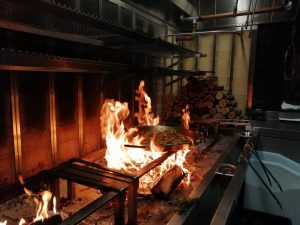
A menu with great wines and their winemakers
The night at Arros QD included a sumptuous tasting menu, which included Valencian paella and wood pigeon paella, accompanied by some of the best wines: Valdesil (Valdesil on Las 2014), Sei Solo (Prelude of Sei solo 2015 and 2016), González Byass (Tío Pepe en rama) and Williams & Humbert (Amontillado As you like it). Winemakers Borja Prada (Valdesil) and Javier Zaccagnini (Sei solo), explained to the guests at the event the characteristics of their wines.
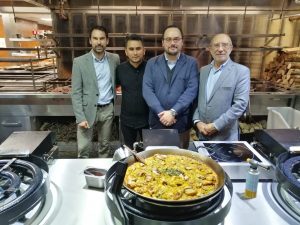
The restaurant by three Michelin starred chef Dacosta, considered one of the most avant-garde cuisines in the world, has recently become one of only 33 in the world to hold the Cullera de Fusta, an honour given to restaurants judged to prepare the highest quality paellas.
“Making food in Spain is more than just cooking; it’s an expression of our culture. That’s why we’re delighted to announce our first partnership with cultural institution Instituto Cervantes to put on this fantastic paella masterclass, and we’re excited to see where this partnership will take us in the future,” explained Marcos Fernández, Arros QD CEO.
Dacosta’s restaurant in London, which opened in June, represents the journey, the adventure and the homecoming for Valencian gastronomy in London with a masterful modernist touch.
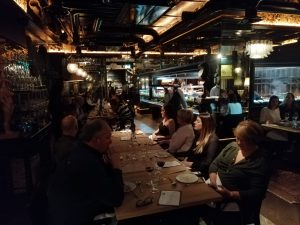
Gran fiesta gastronómica española en el nuevo restaurante de Quique Dacosta en Londres

El restaurante Arros QD y el Instituto Cervantes de Londres organizaron la noche gastronómica ‘Dominar el arte del arroz’, en la que 50 comensales conocieron en profundidad sobre la auténtica paella valenciana de la mano del equipo del chef Quique Dacosta.
“Nuestra intención siempre está asociada a la divulgación. No solamente se trata de cocinar productos nobles y excelentes. En este caso pretendemos también divulgar en Reino Unido el buen hacer de las recetas auténticas en paella, al igual que hacemos con la alta cocina española desde el restaurante tres estrellas Michelin en Dénia”, destacó el chef Dacosta.
En una impresionante parrilla de ocho metros en Arros QD, los 50 comensales aprendieron los secretos para cocinar una auténtica paella, ampliamente reconocida como la receta más internacional de España. Lo hicieron de la mano del jefe de cocina del restaurante, Richard De La Cruz, quien destacó la paella como un evento social que reúne a las personas alrededor de la mesa.

Por su parte, el director del Instituto Cervantes de Londres, Ignacio Peyró, destacó que “estos actos subrayan la calidad de la cocina española tanto en su tradición como en su vocación de vanguardia y su vertiente empresarial. Es magnífico aliarse con un chef mundialmente reconocido para mostrar la calidad de nuestra cocina y nuestros vinos y llegar al corazón de los londinenses”.
Los comensales pudieron disfrutar de una selección canapés exclusivos: piedras de queso parmesano con crema de manchego y bombas de trufa, complementados con música de guitarra española en vivo de la mano del músico Plinio Fernandes, quien tocó canciones de los compositores Heitor Villa-lobos, Manuel de Falla y Fernando Sor, entre otros.

Un menú con grandes vinos y sus viticultores
La noche en Arros QD incluyó un suntuoso menú de degustación, en el que no faltaron la paella valenciana y paella con pechuga de pichón a la piedra, acompañadas de grandes vinos: Valdesil (Valdesil sobre Las 2014), Sei Solo (Preludio de Sei solo 2015 y 2016), González Byass (Tío Pepe en rama) y Williams & Humbert (Amontillado As you like it). Los viticultores Borja Prada (Valdesil) y Javier Zaccagnini (Sei solo), presentes en el acto, explicaron a los comensales las características de sus vinos.

Premiado con tres estrellas Michelin y considerado el creador de una de las cocinas más vanguardistas del mundo, el restaurante de Dacosta en Fitzrovia se convirtió recientemente en en uno de los únicos 33 restaurantes en el mundo que ha recibido la Cullera de Fusta, premio que se otorga a los restaurantes que preparan paellas de la más alta calidad
“Hacer comida en España es más que solo cocinar. Es una expresión de nuestra cultura. Es por eso que estamos encantados de anunciar nuestra primera colaboración con el Instituto Cervantes de Londres para organizar esta fantástica clase magistral de paella, y estamos entusiasmados de ver hacia dónde nos llevará esta asociación en el futuro”, explicó Marcos Fernández, consejero delegado de Arros.
Dacosta, que abrió el restaurante en junio, representa el viaje, la aventura y el regreso a casa de la gastronomía valenciana en Londres con un toque modernista magistral.

Instituto Cervantes participates in The Language Show 2019 in London

Instituto Cervantes in London will participate in the Language Show on the 15-17th November. Hosted in London annually, it encourages learning and improvement across all global languages in colleges and universities, including range of official exams qualifications. There will also be cultural events held in celebration of nations across the United Kingdom.
«The Language Show is a unique opportunity to have direct contact with the language teaching offer available in the UK. To Instituto Cervantes in London, it is the best showcase to promote the center in the country,» underlines the head of studies at Instituto Cervantes in London, Pablo Martínez Gila.
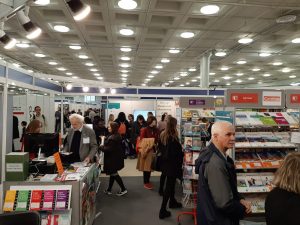
In addition, Martínez Gila highlights the high number of Spanish teachers who approach the stand to learn about the possibilities of training in Spanish as a Foreign Language (ELE), in order to update didactic, methodological and linguistic knowledge.
In its 31st edition, The Language Show is considered the largest language event in Europe, offering outstanding talks, classes and functions including over 100 exhibitors as well as test classes in 23 languages, free lectures and seminars.
The Cervantes Institute will have a joint stand with the Consejería de Educación and the Embassy of Spain in London, in which it will show the academic offer (classes and training), cultural centre and library.

The event takes place in the Olympia fairgrounds, and it’s an opportunity that cannot be missed for anyone learning or teaching a language. The wealth of resources on offer as well as help, advice, ways to learn and teach is unprecedented and, most importantly, will be an inspiration to all those who attend.
Get your free ticket to go to The Language Show here.
London pays a “restrained and exciting” tribute to Spanish exile at the tomb of Chaves Nogales

Instituo Cervantes in London paid tribute today to the memory of all Spanish exiles at the grave of exiled journalist and writer Manuel Chaves Nogales. The tribute took place in the North Sheen Cemetery in London and was chaired by the ambassador of Spain to the United Kingdom, Carlos Bastarreche.
It was also attended by one of the ten grandchildren of Chaves Nogales, Antony Jones, on behalf of Pilar Chaves (the eldest daughter and only survivor of the four children of Chaves Nogales), and other descendants of the famous Sevillian exile, as well as the writer Andrés Trapiello, among other names in the world of culture.
In the event, fragments of Chaves Nogales’ writing and various other texts written for the occasion were read. The act concluded with the placement of a crown of red flowers on the grave of the Sevillian writer and a minute of silence in memory of the Spanish exiles.
“The best values of our democratic Spain”
“The act has been very sober, as it should be, but it is a very exciting day for everyone. We have had the opportunity to honor an eminent exile such as Manuel Chaves Nogales, a voice of enormous moral weight in our convulsive S. XX, and with him all our exiles in the United Kingdom, ”says Ignacio Peyró, director of the Cervantes Institute in London .

This tribute is part of the monographic program Skies so unlike their own that pays tribute to the 80th anniversary of the Spanish Republican exile and is organised by the Instituto Cervantes in London, with the support of the Culture and Scientific Affairs and Education Office of the Embassy of Spain in the United Kingdom and the Commission for the Commemoration of the 80th Anniversary of Exile, among other Spanish and British institutions.
“Chaves Nogales embodies the best values of our democratic Spain. And that is why it is fair that, on the 80th anniversary of the Republican Exile, and on the 75th anniversary of his death, we have gathered at his grave to pay tribute to him and all the exiles,” said Ambassador Bastarreche in his speech.

Since the arrival of the theologian Antonio del Corro in the 16th century, London has welcomed numerous Spanish exiles. In the 19th century names like Agustín Argüelles, Espronceda or Alcalá Galiano arrived on English lands, and in the 20th century, with the Civil War, more would arrive who, according to Bastarreche, were “intellectuals such as Madariaga, Castillejo or Martínez Nadal, poets like Cernuda, publishers such as Joan Gili; Barcelona aviation pioneer Mari Pepa Colomer, or writers like Arturo Barea and Chaves Nogales himself.” That is the reason behind Instituto Cervantes in London’s decision to join the commemorations of exile that have also taken place in other cities such as Paris, Algiers or Moscow.
In fact, today’s event has continued the work carried out to commemorate the exile since 2018, including the delivery of the Arturo Barea archive to the Bodleian library in Oxford, the exhibition on Chaves Nogales organized at Europe House in February, the conference in homage to the so-called “Basque children” of 37 and the co-edition of the book Routes of Spanish exile in London.
Foreword of A sangre y fuego

Director of Cervantes Theater in London, Jorge de Juan, read in Spanish the prologue of the book A sangre y fuego by Chaves Nogales, while Candela Gómez translated into English. The stories that make up this book, written between 1936 and 1937, were initially published in several international journals, and portray different events of the Civil War that Chaves Nogales himself knew directly.
“Each of its episodes has been faithfully extracted from a true fact; each of his heroes has a real existence and an authentic personality ”, explains in the prologue of the book Chaves Nogales, who as director of the newspaper Ahora remained in Madrid from the beginning of the war until the end of 1936, when the government of the Republic moves to Valencia and he decides to go into exile. Chaves Nogales died in London in 1944 and he himself confessed before his death his regret of not seeing the end of World War II and the defeat of Nazism.
Defending democracy, truth and coexistence
«On behalf of his whole family, and particularly his daughter Pilar Chaves, it is exciting to participate in this tribute to all Spanish exiles and especially the great journalist and writer, our» pater families, «Manuel Chaves Nogales,» explained his grandson Antony Jones.

“Sometimes you might think that we are experiencing moments when propaganda, the use of labels or slogans, the decrease of democratic values and a lack of understanding that could even lead us to a democratic fracture of our European society. In an even more troubled and confronted era, Chaves Nogales continued his job of walking and counting fighting with the best weapons invented in the world, his pen and his typewriter, his lucidity, international vision and commitment to democracy and truth. A fight that brought him to this place but that, despite a small interruption of about fifty years, did not end here,” said his grandson.

Antony Jones stressed how his grandfather never wanted to be a protagonist, which is why this tribute would have made him feel “strange or even uncomfortable”, hence he sees it convenient to recapitulate from Chaves Nogales’ own book A sangre y fuego, how his commitment leads him to exile and death in the United Kingdom: “My only and humble truth was an insurmountable hatred of stupidity and cruelty (…) idiots and murderers have been produced and acted with identical profusion and intensity on both sides that left Spain (…) I left, when I had the intimate conviction that everything was lost (…) I wanted to allow myself the luxury of not having any solidarity with the murderers. For a Spaniard, this may be an excessive luxury. It pays dearly, of course. ”
“At his grave, with the best possible gravestone and the one that reflects his trade of walking and telling, his own work, I think it is a good time, on behalf of all those who have paid dearly, to remember everything that unites us and commit ourselves again to defend democracy, truth and coexistence,” added Antony Jones.
Removing Chaves Nogales from oblivion

At the event, the writer Andrés Trapiello read a text written for the occasion. In his opinion, “no Spanish writer has been more a victim of both sides of the divided Spain than Manuel Chaves Nogales. He lost the war and lost the literature manuals at the same time. These two Spains almost managed to silence their writings forever, those precisely denouncing the horror of totalitarianism, communism and fascism, which were about to destroy Europe in the most devastating war in the history of Humanity, initiated precisely in Spain with the War Cruel civilian of the many that Spain had known until then”.
For Trapiello, the lucidity with which Chaves Nogales denounced the danger and told the facts of which he witnessed in the first months of the Spanish war, “condemned him for almost seventy years to ostracism, but the awakening of an immense majority of readers belonging Spain has taken a silent and silenced third Spain from oblivion and today Chaves Nogales is perhaps the most incontestable and happy literary resurrection in the recent history of literature.”
The writer defended the homage of a “brave man, committed to the truth and the facts at a time when postmodern totalitarianism, populism and nationalism attempted to destroy Europe again and coexistence between free citizens and the same, that is, what made Chaves leave Spain and come to meet his death so far from his land.”
Londres rinde un homenaje “sobrio y emocionante” al exilio español ante la tumba de Chaves Nogales

El Instituto Cervantes de Londres homenajeó hoy al exilio español ante la tumba del periodista y escritor exiliado Manuel Chaves Nogales. El acto, presidido por el embajador de España en Londres, Carlos Bastarreche, tuvo lugar en el cementerio de North Sheen, y contó con la participación de uno de los diez nietos de Chaves Nogales, Antony Jones, en representación de Pilar Chaves (la hija mayor y única sobreviviente de los cuatro hijos de Chaves Nogales), y de otros descendientes del célebre exiliado sevillano, así como del escritor Andrés Trapiello, entre otros nombres del mundo de la cultura. En el homenaje se leyeron fragmentos del propio Chaves Nogales y diversos textos escritos para la ocasión. El acto concluyó con la colocación de una corona de flores sobre la tumba del escritor sevillano y un minuto de silencio en memoria de los exiliados españoles.
“Los mejores valores de nuestra España democrática”
“El acto ha sido muy sobrio, como debía ser, pero es un día muy emocionante para todos. Hemos tenido oportunidad de honrar a un exiliado eminente como es Manuel Chaves Nogales, una voz de enorme peso moral en nuestro convulso S. XX, y con él a todos nuestros exiliados en Reino Unido”, afirma Ignacio Peyró, director del Instituto Cervantes de Londres.

Este homenaje forma parte del programa monográfico Cielos tan distintos a los suyos que rinde homenaje al 80 aniversario del exilio republicano español y está organizado por el Instituto Cervantes de Londres, con el apoyo de las Consejerías de Cultura y Asuntos Científicos y de Educación de la Embajada de España en Reino Unido y la Comisión para la Conmemoración del 80 Aniversario del Exilio, entre otras instituciones españolas y británicas.
“Chaves Nogales encarna los mejores valores de nuestra España democrática. Y por eso es de justicia que, en el 80 aniversario del Exilio republicano, y en el 75 aniversario de su muerte, nos hayamos reunido ante su tumba para rendirle el homenaje debido a él y a todos los exiliados”, señaló el embajador Bastarreche en su intervención.

Desde la llegada del erasmista Antonio del Corro en el siglo XVI, Londres ha acogido a numerosos españoles exiliados. Si en el XIX llegaron a tierras inglesas nombres como Agustín Argüelles, Espronceda o Alcalá Galiano, en el siglo XX, con la Guerra Civil, llegarían, según citó Bastarreche, “intelectuales como Madariaga, Castillejo o Martínez Nadal, poetas como Cernuda, editores como Joan Gili; Mari Pepa Colomer, pionera barcelonesa de la aviación o escritores como Arturo Barea y el propio Chaves Nogales”. Por eso el Instituto Cervantes de Londres ha decidido sumarse a las conmemoraciones del exilio que han tenido lugar también en otras ciudades como París, Argel o Moscú.
El acto de hoy, de hecho, ha continuado los trabajos desarrollados para conmemorar el exilio desde 2018, entre ellos la entrega del archivo de Arturo Barea a la biblioteca Bodleiana de Oxford, la exposición sobre Chaves Nogales organizada en Europe House en el mes de febrero, la conferencia en homenaje a los llamados “niños vascos” del 37 o la coedición del libro Rutas del exilio español en Londres.
Prólogo de ‘A sangre y fuego’

El director del Cervantes Theatre en Londres, Jorge de Juan, leyó en español el prólogo del libro A sangre y fuego de Chaves Nogales, mientras que Candela Gómez hizo lo propio en inglés. Los relatos que componen este libro, redactados entre 1936 y 1937, fueron publicados inicialmente en varias revistas internacionales, y retratan distintos sucesos de la Guerra Civil que el propio Chaves Nogales conoció directamente.
“Cada uno de sus episodios ha sido extraído fielmente de un hecho verídico; cada uno de sus héroes tiene una existencia real y una personalidad auténtica”, explica en el prólogo del libro Chaves Nogales, quien como director del periódico Ahora permaneció en Madrid desde el inicio de la guerra hasta finales de 1936, cuando el gobierno de la República se traslada a Valencia y él decide exiliarse. Chaves Nogales moriría en Londres en 1944, con la pena, por él mismo confesada, de no ver el fin de la Segunda Guerra Mundial y la derrota del nazismo.
Defender la democracia, la verdad y la convivencia
“En representación de toda su familia, y particularmente de su hija Pilar Chaves, es emocionante participar en este homenaje a todos los exiliados españoles y especialmente al gran periodista y escritor, nuestro “pater familias”, Manuel Chaves Nogales”, explicó su nieto Antony Jones.

“A veces se podría pensar que estamos viviendo momentos en que predomina la propaganda, el uso de etiquetas o eslogans, la disminución de valores democráticos y una falta de comprensión que nos podría incluso llevar a una fractura democrática de nuestra sociedad europea. En una época aún más revuelta y enfrentada, Chaves Nogales seguía su oficio de andar y contar luchando con las mejores armas inventadas en el mundo, su pluma y su máquina de escribir, su lucidez, visión internacional y compromiso con la democracia y la verdad. Una lucha que le trajo a este lugar pero que, a pesar de una pequeña interrupción de unos cincuenta años, no terminó aquí”, subrayó su nieto.

Antony Jones recalcó cómo su abuelo nunca quiso ser protagonista, por lo cual este homenaje le hubiera hecho sentirse “extraño o incluso incómodo”, de ahí que vea conveniente recapitular desde la propia obra A Sangre y Fuego de Chaves Nogales, cómo su compromiso le lleva al exilio y fallecimiento en Reino Unido: “Mi única y humilde verdad era un odio insuperable a la estupidez y a la crueldad (…) idiotas y asesinos se han producido y actuado con idéntica profusión e intensidad en los dos bandos que partieron España (…) me fui, cuando tuve la íntima convicción de que todo estaba perdido (….) Yo he querido permitirme el lujo de no tener ninguna solidaridad con los asesinos. Para un español quizás sea este un lujo excesivo. Se paga caro, desde luego”.
“Ante su tumba, con la mejor lápida posible y la que refleja su oficio de andar y contar, su propia obra, creo que es un buen momento, en nombre de todos los que lo han pagado caro, de recordar todo lo que nos une y comprometernos de nuevo de defender la democracia, la verdad y la convivencia”.
Sacando a Chaves Nogales del olvido

En el acto, el escritor Andrés Trapiello leyó un texto escrito para la ocasión. En su opinión, “ningún escritor español ha sido más víctima de las dos Españas que Manuel Chaves Nogales. Perdió la guerra y perdió los manuales de literatura al mismo tiempo. Esas dos Españas casi lograron silenciar para siempre sus escritos, aquellos precisamente que denunciaban el horror de los totalitarismos, comunismo y fascismo, que se aprontaban a destruir Europa en la guerra más devastadora de la historia de la Humanidad, iniciada precisamente en España con la Guerra Civil más cruel de las muchas que España había conocido hasta entonces”.
Para Trapiello, la lucidez con que Chaves Nogales denunció el peligro y contó los hechos de los que fue testigo en los primeros meses de la guerra española, le “condenó durante casi setenta años al ostracismo, pero el despertar de una inmensa mayoría de lectores pertenecientes a una silenciosa y silenciada tercera España lo ha sacado del olvido y hoy Chaves Nogales es acaso la más incontestable y feliz resurrección literaria de la historia reciente de la literatura”.
El escritor defendió el homenaje de un “hombre valiente, comprometido con la verdad y los hechos, con la verdad de los hechos, en un momento en que los totalitarismos posmodernos, populismos y nacionalismos, quieren destruir de nuevo Europa y la convivencia entre ciudadanos libres e iguales, o sea, aquello que le hizo a Chaves salir de España y venir a encontrarse con su muerte tan lejos de su tierra”.
‘November’ in London: Jorge Galán presents his novel at the LRB after 30 years of El Salvador’s massacre

Salvadoran writer and poet Jorge Galán presented the English translation of his novel November, published by Constable, at an event held at the acclaimed London Review Bookshop and organized with the support of the Instituto Cervantes in London. Galán’s book won the Royal Spanish Academy Award, one of the most prestigious in the language.
In the novel, Galán narrates the murder of six Spanish Jesuits and two Salvadoran women at the Catholic University of San Salvador. The year is 1989 and the Central American country lives mired in the horror of the civil war. A fateful early morning of November, a group of armed men entered the premises of the Catholic University and murdered eight people in cold blood.
In the days following the massacre, only Father Tojeira is determined and committed to discovering the murderers. The only witness who could help resolve the case is silenced by government authorities. November is an energetic and brave novel that investigates the tragic events that shocked El Salvador and Latin America.
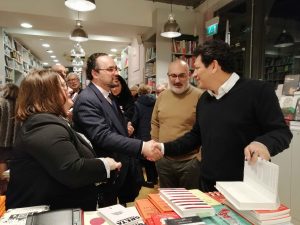
Too much silence
“In El Salvador there is too much silence towards important stories. Everything is locked in silence, that’s why I wanted to bring these stories to the present,” explained Galán in the London bookstore. The writer said that when the events occurred there was not much information because there was no internet, hence the extra importance of telling what happened to future generations. There was what he describes as a war environment, in which people talked very little about what happened and the rest of the things that happened.
Galan regrets that his country does not have a culture of peace: “We live in a shady and cultural context, where crime is the daily bread. I feel a huge void in society. The Jesuits were an important part of society and we have not been able to fill it, ”added the writer.
Galán (San Salvador, 1973) is the author of several books of poems and the novel The Room at the Bottom of the House, which has been translated into several languages. He won the Ibero-American Prize for published work Jaime Sabines 2011, the Antonio Machado International Prize 2009, the Adonais Prize 2006 and the National Prize of El Salvador in both poetry and novel and children’s stories.
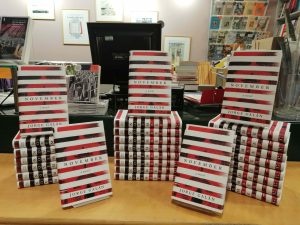
The writer is clear that with November his intention was not to write a religious novel. In that sense, it is clear that the murdered Jesuits could have been anywhere in the world, but they decided to stay in El Salvador, a country where there had been murders of priests since 1970, so consciously, they knew they were risking their lives . “Religious or not, it is impossible that this story does not provoke something, it is a real and human sacrifice. They decided to stay, and in the end, they lost their lives,” he said.
Exiled in Spain since 2015 for the threats received after publishing his novel, in December Galán plans to return to his country: “I am not afraid, I need to return, I cannot not return, it is impossible not to return. I don’t see myself not going to my country.”
During the audience’s question time, Galán explained that although his perception of what happened may be subjective and poetic, he believes that El Salvador is a place that has experienced a lot of violence and that can be perceived in many parts of the country.
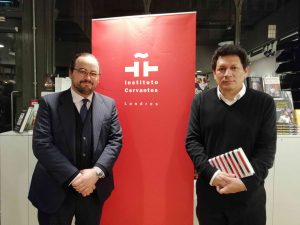
Galán also remarked that November was written using the technique of the novel form because that was what he had in mind at first. “I do not consider it a testimony, although I use correct information and data, but I recreate the context and write for someone who is 22 to 25 years old in El Salvador to read it. And I thought the novel was the right thing, ”he said.
His intention was to reach all audiences, but at first, he decided to write about the murders because he realised that young people at UCA University did not know anything about what happened.
‘Noviembre’ en Londres: Jorge Galán presenta su novela en la LRB al cumplirse 30 años de la masacre de El Salvador

El escritor y poeta salvadoreño Jorge Galán presentó la traducción al inglés de su novela Noviembre, publicada por la editorial Constable, en un acto celebrado en la aclamada librería London Review Bookshop y organizado con el apoyo del Instituto Cervantes de Londres. El libro de Galán ganó el Premio de la Real Academia Española, uno de los más prestigiosos de la lengua.
En la novela, Galán narra el asesinato de seis jesuitas españoles y dos mujeres salvadoreñas en la Universidad Católica de San Salvador. Corre el año 1989 y el país centroamericano vive sumido en el horror de la guerra civil. Una fatídica madrugada de noviembre, un grupo de hombres armados entra en las instalaciones de la Universidad Católica y asesina a estas ocho personas a sangre fría.
En los días que siguen a la masacre, sólo el nuevo rector de los jesuitas, el padre Tojeira, está empeñado y comprometido en descubrir a los asesinos. La única testigo que podría ayudar a resolver el caso es silenciada por las autoridades gubernamentales. Noviembre es una novela enérgica y valiente que investiga los trágicos acontecimientos que conmocionaron El Salvador y Latinoamérica.

Demasiado silencio
“En El Salvador hay demasiado silencio hacia las historias importantes. Todo se encierra en el silencio, por eso yo quería traer estas historias al presente”, explicó Galán en la librería londinense. El escritor destacó que cuando ocurrieron los hechos no había mucha información porque no había internet, de ahí la importancia extra de contar lo ocurrido a las futuras generaciones. Había lo que describe como un ambiente de guerra, en el que la gente hablaba muy poco sobre lo ocurrido y el resto de cosas que pasaban.
Galán lamenta que su país no tenga una cultura de paz: “Vivimos en una sociedad sombría y cultural coyuntural, donde el crimen es el pan de cada día. Siento un vacío enorme en la sociedad. Los jesuitas eran una parte importante de la sociedad y no hemos sabido llenarlo”, añadió el escritor.
Galán (San Salvador, 1973) es autor de varios libros de poemas y de la novela La habitación al fondo de la casa, que ha sido traducida a varios idiomas. Obtuvo el Premio Iberoamericano para obra publicada Jaime Sabines 2011, el Premio Internacional Antonio Machado 2009, el Premio Adonais 2006 y el Premio Nacional de El Salvador tanto en poesía como en novela y en cuento infantil.

El escritor tiene claro que con Noviembre su intención no era escribir una novela religiosa. En ese sentido, tiene claro que los jesuitas asesinados podrían haber estado en cualquier lugar del mundo, pero decidieron quedarse en El Salvador, un país donde había habido asesinatos de sacerdotes desde 1970, por lo que de forma consciente, sabían que estaban arriesgando sus vidas. “Religioso o no, es imposible que esta historia no te provoque algo, es un sacrificio real y humano. Decidieron quedarse, y al final, perdieron su vida”, puntualizó.
Exiliado en España desde 2015 por las amenazas recibidas tras publicar su novela, en diciembre Galán planea volver a su país: “No tengo miedo, necesito volver, no puedo no volver, es imposible no volver. No me veo no yendo a mi país”.
Durante el turno de preguntas de la audiencia, Galán explicó que si bien su percepción de lo sucedido puede ser subjetiva y poética, cree que El Salvador es un lugar que ha vivido mucha violencia y eso puede percibirse en muchos lugares del país.

Galan también remarcó que escribió Noviembre utilizando la técnica de la novela porque eso era lo que tenia en mente en un primer momento. “No lo considero un testimonio, aunque use información y datos correctos, sino que recreo el contexto y escribo para que alguien que tiene de 22 a 25 años en El Salvador lo lea. Y pensé que la novela era lo correcto”, afirmó.
Su intención era llegar a todos los públicos, pero en un primer momento, se decidió a escribir sobre los asesinatos porque se dio cuenta de que los jóvenes en la Universidad UCA no sabían nada de lo ocurrido.
London and Oxford celebrate the memory of exile in the United Kingdom
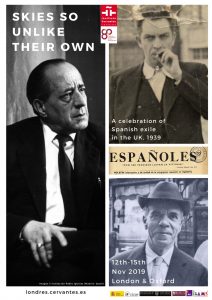
Instituto Cervantes in London has organised a commemorative programme which pays tribute to the Spanish Republican exiles on the occasion of the 80th anniversary of the end of the Civil War. The programme is entitled “Skies so unlike their own: a celebration of Spanish exile in the UK, 1939” and will feature conferences, round tables, book presentations, a film screening and a concert. All events are free and open to the public and will take place between November 12th and 15th in London and Oxford.
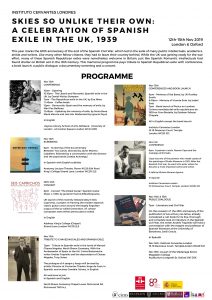
One of the most important features of the program is the open tribute to Manuel Chaves Nogales. It will take place at the grave of this Sevillian writer in the North Sheen cemetery.
The exile of numerous Spanish intellectuals, academics, artists and writers to the United Kingdom took place while the British themselves prepared to face World War II. With the reception of important names like Luis Cernuda, Manuel Chaves Nogales or Arturo Barea, the United Kingdom was, once again, the capital of Spanish intelligence, as it had been in the 19th century during the exile of liberals and romantics.

Reintegration of Spanish memories
“With this program we conclude our homage to Spanish exile,” says director of Institute Cervantes of London, Ignacio Peyró, “a tribute that began in 2018 with the transfer of the Arturo Barea archive to the Bodleian Library in Oxford and continued with the exhibition dedicated to Manuel Chaves Nogales at Europe House in February of this year.”
For Peyró, “to claim exile is to reintegrate the memory of Spain, including that of those Spaniards of the exodus and the ‘crying’ of which León Felipe spoke. And paying homage to exile is also a tribute to that fair and democratic country that is contemporary Spain, of which so many exiles dreamed.”
The programme is supported by multiple companies including the Interministerial Commission for the Commemoration of the 80th Anniversary of Spanish exile and Instituto Cervantes as well as the Embassy of Spain, Magdalen College (Oxford), Birbeck University of London, King’s College Modern Language Centre, CICUS (University of Seville) and The Iberian and Latin American Music Society.
Development
The conference starts with lectures on Tuesday 12th November at Birkbeck – University of London, where professor of Spanish Literature at Kings’ College (London), Daniel Muñoz Sempere, will discuss liberal and romantic Spanish exile in the United Kingdom. Alongside him, associate researcher at Cardiff University, Eva Nieto will talk about Republican exile. Furthermore, Mari Paz Balibre (reader in Modern Spanish Literature and Cultural Studies at Birkbeck – University of London) will talk about democratic Spain and the memory of exile.
The morning of conferences will conclude with the round table “Updating the Memory of Exile”, with the participation of artist Sonia Boue, professor María Mencía and writer Lala Isla. Moderated by director of Instituto Cervantes in London, Ignacio Peyró. In this round table, each participant will discuss projects related to the memory of exile.
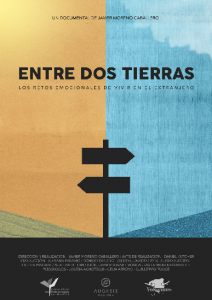
Also on November 12th, at 6pm in King’s College, the screening of the documentary Between Two Lands (in Spanish with English subtitles) directed by Javier Moreno Caballero, followed by a discussion with the director himself and the psychiatrist, Joseba Achotegui.
Between Two Lands talks about the emotional challenges of living abroad and the phenomenon known by experts as «migratory grief.» Through several recent testimonies of Spaniards, the talk will seek to understand the complexity of the experiences that immigrants must face during their experience away from their motherland.
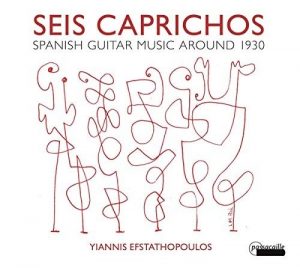
Tuesday 12th ends with the concert, The Exiled Guitar: Spanish music for guitar in the 1930s, by guitarist Yiannis Efstathopoulos, in the chapel of King’s College, a famous neo-Gothic monument.
Efstathopoulos presents this concert based on his latest album, Six Whims, Spanish music for guitar around 1930. Victims of the Generation of 27 music, the composers presented here were persecuted by Franco or had to go into exile. The works to be played by the Greek performer, a student of the music of exile, are pieces for guitar composed in a fascinating moment, when the now iconic Spanish instrument was still looking for its place in the world and formulating its identity within cultured music in Spain and in the international context.
On Wednesday 13th November at 12pm, there will be a tribute to Spanish exiles in the tomb of Manuel Chaves Nogales, in the North Sheen cemetery. It will be attended by the ambassador of Spain in the United Kingdom, Carlos Bastarreche, the writer Andrés Trapiello and the grandson of Chaves Nogales, Tony Jones.
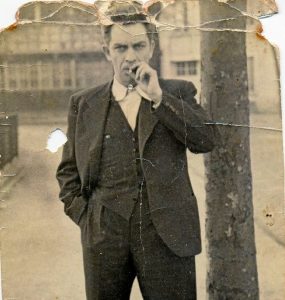
On the 75th anniversary of the death of Chaves Nogales, the planned tribute includes a reading of the prologue from, A Sangre y Fuego, in Spanish and English, by the artistic director of the Cervantes Theater, Jorge de Juan, and the actress Candela Gómez. A reading of the specially commissioned Trapiello text will also be read in honour of the occasion.
Forgotten for decades, the Sevillian writer and journalist Chaves Nogales (1897-1944) is today considered one of the most lucid and honest voices of Spanish literature in the twentieth century. He is known, above all, for the independent thought and testimonial value of books such as A Sangre y Fuego which was written about the Spanish Civil War. Killed in hard circumstances during his exile in London, Chaves Nogales was buried in a grave without a gravestone in the North Sheen Cemetery.
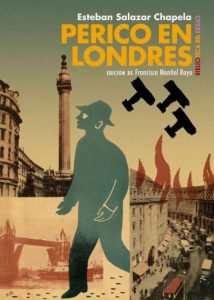
Our final event on Wednesday 13th at 6pm, takes place in the library of the Cervantes Institute in London. We will seek to recover the memory of Ilsa Barea – translator of the work of Arturo Barea – with a talk by his niece, Uli Rushby-Smith. We also want to give continuity to the different claims of the memory of the writer Vicente Soto, for which Isabel Soto, a university professor of literature and daughter of the exiled intellectual, will talk about the author and read translated fragments of his work. Finally, the reissue of the book Perico in London will be presented: Novel Chronicle of the Republican Exile of 1939 in Great Britain by Esteban Salazar Chapela. With the participation of Professor of History of the Art of the University of Seville Luis Méndez; literary publisher, Francisca Montiel, and Christina Linares, from the Renaissance Publishing House.

The following day, Thursday 14th at 6pm, in the library of the Cervantes Institute in London, we will host the conference “A Painter in Exile: Ramón Gaya and the nostalgia of El Prado”, by Miriam Moreno Aguirre, expert in the Murcian artist, about whom he has published a doctoral thesis and a monograph.
Gaya, founder of the magazine Hora de España, was one of the painters who made copies of the paintings of the Prado Museum in 1932. Since then he has exhibited them, along with Antonio Sánchez Barbudo, in the Circulating Museum of the Pedagogical Missions of the Republic, until the beginning of the Civil War. Gaya, a painter of deep influence and also a great essayist, defined the Prado Museum as “a kind of homeland” and took lessons from his works to promote a figuration compatible with pictorial modernity.
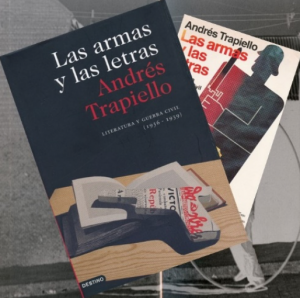
Finally, our concluding event at 7pm on the 14th November, will be a public conversation between the writer Andrés Trapiello and the essayist and professor Jordi Gracia, in celebration of the 25th anniversary of the publication of Weapons and Letters, a volume of Trapiello already considered a cult book by his free, thorough and complete look on literature in the Spanish Civil War.
On Friday 15, at 7pm, Trapiello and Gracia will hold a talk of similar characteristics in the auditorium of Magdalen College in Oxford, within the Madariaga Series with which, under the direction of Professor Juan Carlos Conde, the Cervantes Institute collaborates.


